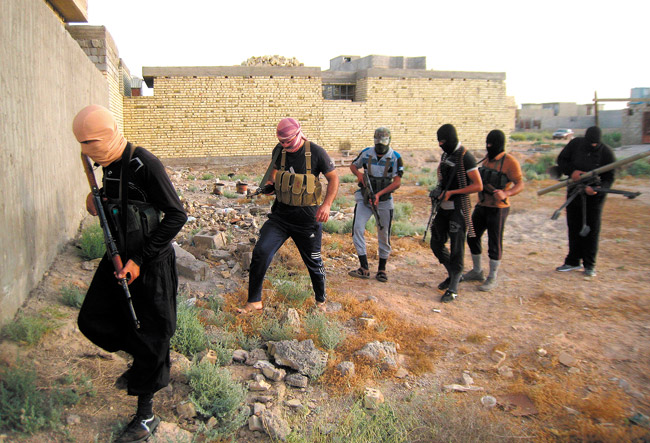The Only Way Iraq War Could Turn

Masked anti-government gunmen patrol Fallujah, Iraq, after Al-Qaida-linked fighters and their allies seized the city. Saudi Arabia and other Gulf petro-powerhouses encouraged a flow of cash to Sunni rebels in Syria for years. But now they face a worrying blowback as an al-Qaida breakaway group that benefited from some of the funding storms across a wide swath of Iraq. Gulf nations fear its extremism could be a threat to them as well. But the tangle of rivalries in the region is complex: Saudi Arabia and its allies firmly oppose any U.S. military action to stop the Islamic State’s advance in Iraq because they don’t want to boost its Shiite-led prime minister or his ally, Iran AP PHOTO
I can’t see any way that America can get out of Iraq without the serious involvement and cooperation of the Arabic Sunni Saudis, the Persian Shia Iranians and the Sunni Turks — a treaty among those traditional regional rivals allowing Sunni, Shia and Kurdish homelands in the former Iraq would be a good start, and would provide a sort of buffer between those powers.
And I can’t see a way out of Iraq without finally letting the people of the region redraw their own borders. They’ve been subject to outside dominance since 1299 — a mere 708 years. They could hardly do any worse than Western meddlers have done.
Will there be bloodshed as they sort it out? To answer with a double question: Is there unconscionable bloodshed happening in Iraq now? And how else do you propose to stop it?
Thus I concluded an August 2007 review of Churchill’s Folly by historian Christopher Catherwood. It details how Winston Churchill, then head of the British Colonial Office, gathered a group he termed the “40 Thieves” in April 1921 in Cairo to redraw Middle East borders after the fall of the Ottoman Empire the previous year. Among others, they created a country out of tribal lands — Iraq — that had no business being a country. It should have been three.
They also appointed Feisal, a foreign Sunni (he’d spent most of his life in Constantinople), to be king and rule over a country two-thirds Shia. What could possibly go wrong?
And in light of what’s happening in Iraq today — people redrawing borders at gunpoint while ignoring the wimpish, day-late diplomatic efforts of Secretary of State John Kerry — it’s tragic that efforts to create incentives for Kurd, Sunni and Shia to cooperate weren’t initiated years ago. My proposal in 2007 was a federation of those three sharing oil profits. Given centuries of distrust and fighting between them, maybe it would have failed, maybe not. We’ll never know. It now seems far too late.
So the U.S. today has put itself in the clever position of threatening to bomb the Sunni leaders who helped make our “surge” a success in order to support the Shia government, and effectively serving as Iran’s air force in Iraq, while opposing Iran in Syria’s civil war where we support rebels who are Sunni jihadis and Iran backs the Alawite (Shia sect) Assad regime. Brilliant, and the handiwork of both Bush and Obama got us here.
A couple of other excerpts from that 2007 review seem pertinent today, with comments:
The greatest problem, it seems to me, is that Iraq was never a nation of ideals, or dreams, or unified core beliefs or ethnicity. Today, Catherwood points out, the people of Iraq still identify themselves more by tribal and religious affiliation than as patriotic Iraqis.
They may have cheered the Iraq soccer team, because they love soccer, but they don’t get all chickenskin when they hear their national anthem.
It seems unlikely to the point of impossibility that the Shia majority, dominated by a Sunni minority going back to the Ottomans and then by a Western-appointed monarchy followed by a military dictatorship, will ever give up the dominance they now and newly enjoy.
Prime Minister Nouri al-Maliki has been criticized for not running a more inclusive government, but you can understand what fuels his Shia-first mentality.
It seems equally unlikely that the long-dominant Sunnis would allow themselves to become a persecuted minority, or that the Kurds of Iraq, with a strong regional government now in place and lots of oil underfoot, would be willing to be dominated by Arabs of either Muslim stripe.
Which explains the alliance-for-the-moment of Sunni tribes and fighters of the Islamic State of Iraq and the Levant carving out Sunni lands that include parts of Iraq, Syria and Jordan, as the Kurds happily watch the rest of the country falling away from them.
Today it seems obvious that America’s blundering entry into Iraq, rather than bringing “democracy” to the region, as we were lied to at the time, instead put Iraq on the path to permanent fracturing. This is, the way we administered it, the only way this war against non-existent WMDs masquerading as an oil grab could turn.
With President Obama sounding as wimpish and day-late as his secretary of state in asking Kurd, Sunni and Shia to just play nicely together in the same sandbox, though promising to send 300 special forces troops to Iraq (joining the 170 combat troops he sent to protect our embassy), I’ll close with an excerpt from Catherwood’s book:
“When Iraq becomes strong enough in our opinion to stand alone, we shall be in a position to state that our task has been fulfilled, and that Iraq is an independent sovereign state. But this cannot be said while we are forced year after year to spend very large sums of money on helping the Iraqi government to defend itself and maintain order.”
The speaker? Winston Churchill, one year after creating Iraq. The Brits would stay a bloody decade.
(To see that 2007 review, Google “midweek churchill chapman.”)
dchapman@midweek.com





